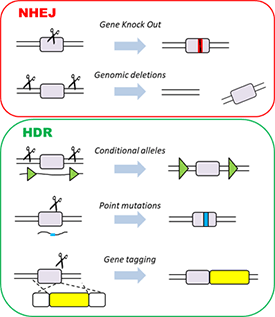
Our services
Transgenic mice
Our original and flagship service is the generation of custom transgenic mouse models, tailored to researcher needs.
We offer a complete service from concept to germline confirmed transgenic line, including construct design, preparation and purification of targeting reagents, generation of the transgenic mouse through embryo microinjection, and confirmation of germline transmission.
We also offer a number of supporting services including mouse colony cryopreservation and the import/rederivation of colonies through in vitro fertilization (IVF) and embryo transfer.
Importantly, we use our expertise to advise and intellectually contribute to project requirements and maintain a continuous dialogue to understand often-changing needs.
If you are interested in generating a custom transgenic mouse model, or any of the other services described, please contact us at genome.editing@manchester.ac.uk.
Internal users can visit our PPMS site for pricing information
CRISPR-Cas9
Strategies mainly focus on CRISPR-Cas9 genome editing, which allows targeted mutagenesis in the single cell embryo. We apply CRISPR-Cas9 to generate a range of endogenous genetic changes, including gene KO, genomic deletions, point mutations, conditional alleles and reporter gene tagging.

Other transgenesis techniques
We have experience with a range of alternative transgenesis techniques, including recombinant DNA approaches such as plasmids and Bacterial artificial chromosomes (BACs), which can be genome integrated in random fashion by linear DNA pro-nuclear injection or piggybac transposase mediated single copy integration
We have also built viral vectors for use in in vivo, including AAV-Cre and AAV-CRISPR that allow you to perform genetic manipulations without creating a new transgenic line and on different backgrounds.
Cell engineering
CRISPR-Cas9 can be used in a variety of different ways to build representative culture models for research, or to perturb gene networks.
Genetically engineered cells
 We can help make a range of CRISPR modified cell types, including:
We can help make a range of CRISPR modified cell types, including:
- Gene knockouts;
- Genomic deletions (such as enitre genes or non-coding regulatory regions);
- Single nucleotide changes, including coding point mutations, disruption of transcription factor binding sites, or disease associated non-coding SNPs;
- Targeted knock in of larger sequences such as transcriptional reporters, or fluorescent fusion genes.
We also have access to a range of tools for the popular derivative applications of CRISPR-Cas9, CRISPRinterference and CRISPRactivation. With these approaches you can achieve potent and specific gene repression or activation in your cells.
We have a range of service options to assist you in the generation of genome edited cells, from assistance with design and generation, optimising CRISPR delivery and assaying efficiency, to generation of the modified cells as either a pooled or clonal population.
Contact us at genome.editing@manchester.ac.uk if you would like more information or to arrange a meeting.
Research and development
As the expert hub of gene editing and molecular biology, we have collaborated with local research groups to apply the latest molecular technologies in novel contexts. We have integrated research and development capacity, and can discuss your project requirements to see if we can assist by building bespoke technologies for specific research goals. Where appropriate, we can collaborate on grant applications.
Please get in touch at genome.editing@manchester.ac.uk if you would like to discuss how we might use our expertise to help your research.
